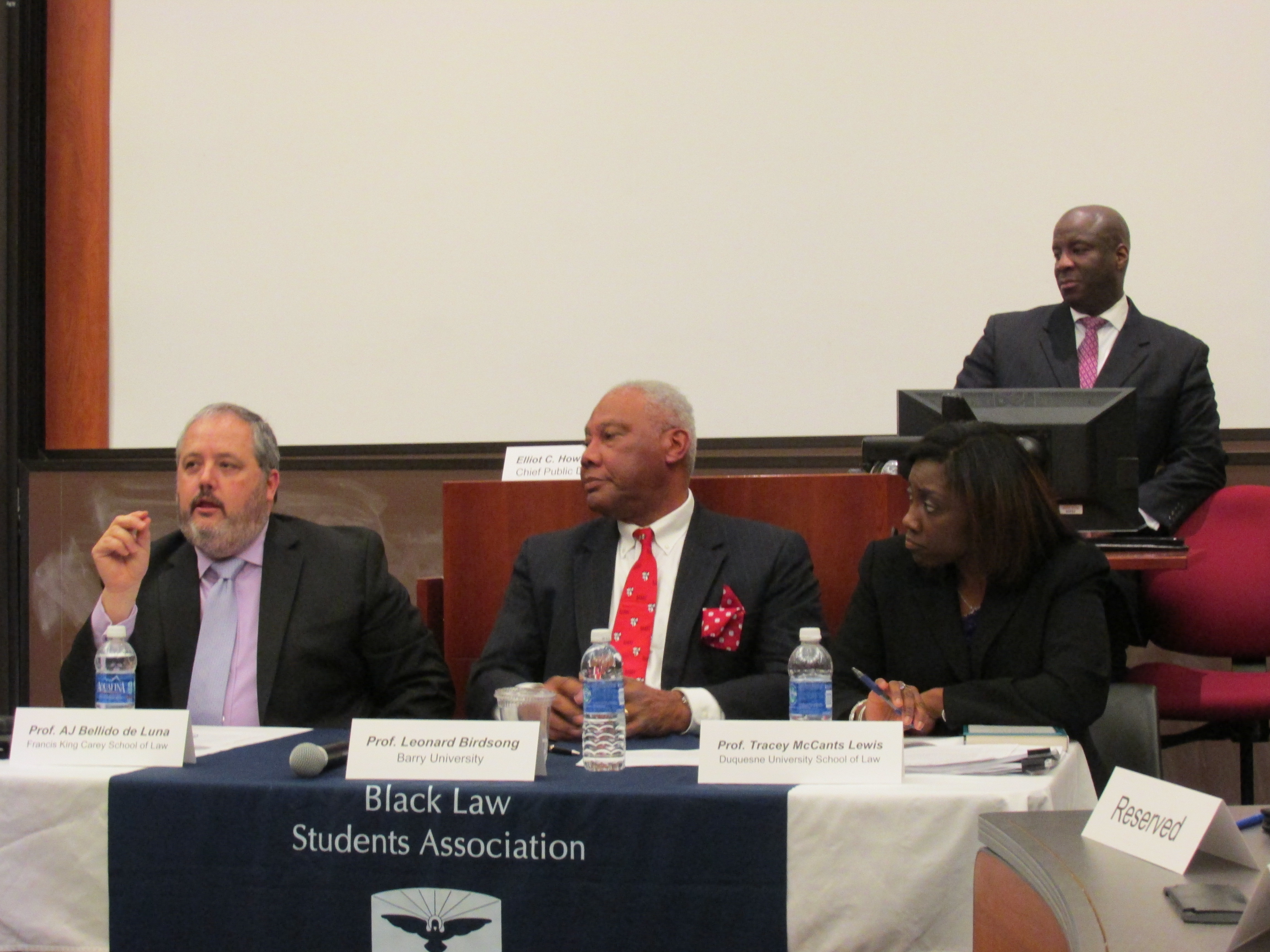by: Eric Donato, Executive Editor
On Thursday, February 6 the Duquesne University School of Law hosted a three-person panel discussion of the controversial George Zimmerman murder trial involving Trayvon Martin.
The event drew overflow crowds from Duquesne’s student body and the community.
The wide-ranging discussion covered topics including police procedure, “stand your ground” laws, the media’s attention to the case, the role of race in the trial, and the mistakes made by the prosecution.
Panel member A.J. Bellido de Luna, former police officer and law professor at the University of Maryland’s law school, said that proper police procedure was initially followed in the George Zimmerman case.
“I think there’s a big misconception that George Zimmerman was not arrested,” he said.
Following police’s arrival on the scene of the shooting, Bellido de Luna said Zimmerman was handcuffed, read his rights, and had his picture taken, which is all standard and appropriate police procedure. Bellido de Luna said that an officer at the scene “actually wrote out a statement of charges to bring George Zimmerman in front of a hearing officer, but was ultimately overruled by a more senior officer in the police department.”
Leonard Birdsong, former diplomat and law professor at Barry University, opined that the reason Zimmerman was not booked was because in 2005 the Florida legislature enacted a “stand your ground” law. In Florida, where the shooting occurred, the “stand your ground” law permits the use of deadly force in defense of one’s life without the need to retreat, and is “coupled with the fact that there is a presumption that you acted reasonably,” he said.
Though Zimmerman never affirmatively raised the “stand your ground” law in his defense, Birdsong suggested that the existence of the “stand your ground” law played a role in keeping Zimmerman from initially being booked for the shooting.
“Its very very rare to have an ‘un-arrest,’ especially in a shooting death…usually you collect the evidence, present it to the prosecutor, the prosecutor determines whether or not to move forward,” said Bellido de Luna, “in this case, that didn’t happen.”
Tracey McCants Lewis, Professor at Duquesne University School of Law and author of a chapter in the book Pursuing Trayvon Martin: Historical Contexts and Contemporary Manifestations of Racial Dynamics, said that the unusual police procedure forced Martin’s family to turn to the media to seek justice.
“I believe his parents really took the initiative to…get the story out” including using social media and African American journalists, said McCants Lewis. Ultimately the mainstream media picked up the story, and “that coverage then put the stand your ground law into the media spotlight,” she said.
Bellido de Luna said that race was certainly a factor in the trial, most prominently in the cross examination of Martin’s friend Rachel Jeantel, who Bellido de Luna said is a “sweet, intelligent, capable woman,” who was made to look uneducated and ignorant because of the way she spoke and dressed.
McCants Lewis pointed out that there were cultural differences between the jury and Jeantel which the prosecution failed to bring to the jury’s attention, for instance that English was not Jeantel’s native tongue.
“The defense didn’t come out and necessarily throw [race] in your face, but it was there,” said McCants Lewis.
The panel agreed that the prosecution failed to effectively make its case because it didn’t prepare its witnesses, consistently contradicted itself, and seriously fumbled its closing argument.
“I was a prosecutor for a long time, and this was the worst thing I’d ever seen,” said Birdsong.
The panel discussion was moderated by Elliot Howsie, Chief of Allegheny County’s Public Defenders Office. It was hosted by the Black Law Students Association of the Duquesne University School of Law.
On February 26, 2012, 17-year-old African American Trayvon Martin was shot and killed by George Zimmerman, the neighborhood watch coordinator for a gated community in Florida. Zimmerman called police to report Martin as being suspicious, and soon thereafter a physical altercation ensued between the two. Zimmerman claimed that Martin, who was unarmed, attacked him, and Zimmerman was found not guilty of murder on July 13, 2013. The case became the focal point for a national discussion on the role race plays in the criminal justice system.
